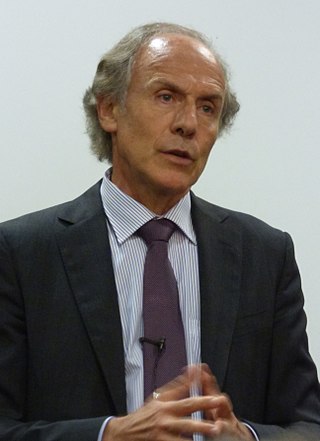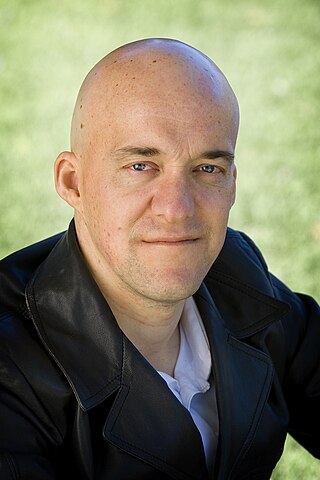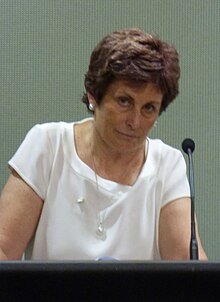
The President's Council of Advisors on Science and Technology (PCAST) is a council, chartered in each administration with a broad mandate to advise the president of the United States on science and technology. The current PCAST was established by Executive Order 13226 on September 30, 2001, by George W. Bush, was re-chartered by Barack Obama's April 21, 2010, Executive Order 13539, by Donald Trump's October 22, 2019, Executive Order 13895, and by Joe Biden's February 1, 2021, Executive Order 14007.

Rear Admiral Kevin John Scarce, is a retired Royal Australian Navy officer who was the 34th Governor of South Australia, serving from August 2007 to August 2014. He was succeeded by Hieu Van Le, who had previously been his lieutenant governor. He was Chancellor of the University of Adelaide from 2014 to 2020.

Alan Simon Finkel is an Australian neuroscientist, inventor, researcher, entrepreneur, educator, policy advisor, and philanthropist. He was Australia’s Chief Scientist from 2016 to 2020. Prior to his appointment, his career included Chancellor of Monash University, President of the Australian Academy of Technology and Engineering (ATSE), and CEO and founder of Axon Instruments, and CTO for the electric car start-up Better Place Australia.

The prospect of nuclear power in Australia has been a topic of public debate since the 1950s. Australia has one nuclear plant in Lucas Heights, Sydney, but is not used to produce nuclear power, but instead is used to produce medical radioisotopes. It also produces material or carries out analyses for the mining industry, for forensic purposes and for research. Australia hosts 33% of the world's uranium deposits and is the world's third largest producer of uranium after Kazakhstan and Canada.

Barry William Brook is an Australian scientist. He is an ARC Australian Laureate Professor and Chair of Environmental Sustainability at the University of Tasmania in the Faculty of Science, Engineering & Technology. He was formerly an ARC Future Fellow in the School of Earth and Environmental Sciences at the University of Adelaide, Australia, where he held the Sir Hubert Wilkins Chair of Climate Change from 2007 to 2014. He was also Director of Climate Science at the Environment Institute.

Tanya Mary Monro is an Australian physicist known for her work in photonics. She has been Australia's Chief Defence Scientist since 8 March 2019. Prior to that she was the Deputy Vice Chancellor, Research and Innovation (DVCR&I) at the University of South Australia. She was awarded the ARC Georgina Sweet Australian Laureate Fellowship in 2013. She was the inaugural chair of photonics, the inaugural director of the ARC Centre of Excellence for Nanoscale Biophotonics and the inaugural director of the Institute for Photonics & Advanced Sensing (IPAS), and the inaugural director of the Centre of Expertise in Photonics (CoEP) within the School of Chemistry and Physics at the University of Adelaide. Monro has remained an adjunct professor of physics at the University of Adelaide following her departure from the institution. In 2020 she was awarded the title of Emeritus Professor at the University of South Australia.

The Olympic Dam mine is a large poly-metallic underground mine located in South Australia, 550 km (340 mi) NNW of Adelaide. It is the fourth largest copper deposit and the largest known single deposit of uranium in the world. Copper is the largest contributor to total revenue, accounting for approximately 70% of the mine's revenue, with the remaining 25% from uranium, and around 5% from silver and gold. BHP has owned and operated the mine since 2005. The mine was previously owned by Western Mining Corporation.
Katherine Wilson is a molecular biologist and a marine scientist. She is also the executive director of the science division at the Office of Environment and Heritage (OEH), New South Wales. Wilson is responsible for the delivery of OEH's science program, which provides technical analysis, expert advice and research to support the NSW government's policy and program objectives in environmental management. As a member of the OEH Executive, Wilson guides delivery of services ranging from energy efficiency programs to management of national parks. Wilson is also a Board Member of the Low Carbon Living Cooperative Research Centre and Chair of the External Advisory Committee, Australian Rivers and Wetlands Centre, University of New South Wales.
Ian Geoffrey Gould is a former Chancellor of the University of South Australia (2008–2015) and former Managing Director (Australia) of Rio Tinto Group. Gould is considered to be one of South Australia's most influential people.
Erica Lee Smyth is a Western Australian geologist, senior mining executive and chair of uranium exploration company, Toro Energy. She grew up in Geraldton, Western Australia and spent much of her early career with BHP and later Woodside Petroleum. In 2010 she received a Lifetime Achievement Award from the Western Australian Chamber of Minerals—the first of its kind for women in resources. In 2008 she received an Honorary Doctor of Letters from the University of Western Australia and in 2012 became an elected Fellow of the Australian Academy of Technological Sciences and Engineering.
UCL Australia was an international campus of the University College London, located on Victoria Square in Adelaide, South Australia. It had three parts: the School of Energy and Resources (SERAus), the International Energy Policy Institute (IEPI) and a branch of UCL's Mullard Space Science Laboratory. UCL Australia described its university community as "welcoming, dynamic and influential." The campus closed in December 2017.
Stephen Lincoln is a chemistry and physics professor at the University of Adelaide's Environment Institute. His work in molecular science has resulted in over 300 publications in scientific journals and he is the author of Challenged Earth: An Overview of Humanity’s Stewardship of Earth (2006), a book in which he discusses population, water, food, biotechnology, health, energy, climate change and the ozone layer. He has a long-term interest in nuclear power and is a board member and spokesperson for South Australian Nuclear Energy Systems, a private Australian company established in 2014 to explore the feasibility of nuclear industrial development projects in South Australia. Lincoln has been a media spokesperson on nuclear issues in the wake of the Fukushima nuclear disaster and in the lead up to South Australia's Nuclear Fuel Cycle Royal Commission in 2015. His work has been awarded by the Royal Australian Chemical Institute and UNESCO.
Benjamin "Ben" Heard is a South Australian environmental consultant and an advocate for nuclear power in Australia, through his directorship of environmental NGO, Bright New World.

The Nuclear Fuel Cycle Royal Commission is a Royal Commission into South Australia's future role in the nuclear fuel cycle. It commenced on 19 March 2015 and delivered its final report to the Government of South Australia on 6 May 2016. The Commissioner was former Governor of South Australia, Kevin Scarce, a retired Royal Australian Navy Rear-Admiral and chancellor of the University of Adelaide. The Commission concluded that nuclear power was unlikely to be economically feasible in Australia for the foreseeable future. However, it identified an economic opportunity in the establishment of a deep geological storage facility and the receipt of spent nuclear fuel from prospective international clients.
Nils Göran Arne Roos FTSE is a Swedish academic, technologist, author and businessman. He is a specialist in the field of intellectual capital and an expert in innovation management and strategy. He was appointed Thinker in Residence on industry development by the Government of South Australia in 2011, and subsequently moved to the state's Economic Development Board, where he serves as a member. Amongst a number of other positions, he is also a member of the Flinders University Council. Roos was named one of the 13 most influential thinkers for the 21st century by the Spanish business journal Direccion y Progreso.
Jim McDowell is a lawyer and defence sector businessman based in South Australia. He is a former CEO of BAE Systems Australia and BAE Systems Saudi Arabia. He was the Chief Executive of the Department of the Premier and Cabinet of the Government of South Australia from 2018, before moving to become CEO of Nova Systems, a global engineering services and technology solutions company, in November 2020. In May 2023, he was appointed Deputy Secretary Naval Building and Sustainment at the Australian Department of Defence.
Adrian "Adi" Paterson is a South African scientist and engineer best known for his work on Pebble Bed modular reactor research and development. He was CEO of the Australian Nuclear Science and Technology Organisation (ANSTO) from March 2009 till September 2020.
The nuclear industry in South Australia is focused on uranium mining, milling and the export of uranium oxide concentrate for use in the production of nuclear fuel for nuclear power plants. The state is home to the world's largest known single deposit of uranium, which is worked by BHP at the Olympic Dam mine.
Isabella Caroline McMillen, is an Australian medical and health academic and the incumbent Chief Scientist of South Australia since October 2018. She is a Fellow of the Australian Academy of Health and Medical Sciences, a Fellow of the Royal Society of New South Wales and a Bragg Member of the Royal Institution of Australia. She is a Director of Compass Housing Services Co Ltd, the South Australian Health and Medical Research Institute, the Australian Science Media Centre and a member of the Council of the University of South Australia.
The Chief Scientist of South Australia is an independent advisory role to the Government of South Australia, providing advice to the Premier and Cabinet on matters of science, technology, innovation and research. The Chief Scientist chairs the South Australian Science Council and recommends to the government new members for the Council.








